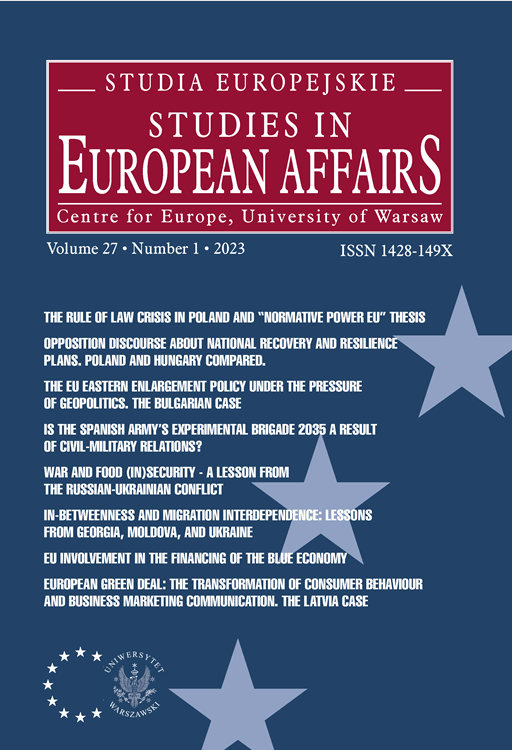
ISSUE: 1/2023
- Volume 27
- Number 1
- 2023
Subscribe NEWSLETTER
Studia Europejskie –
Studies in European Affairs
ISSN: 1428-149X
e-ISSN: 2719-3780
License
Articles published in the journal are under a Creative Commons Attribution – Non Commercial – No Derivatives 4.0 International License
EU Involvement in the Financing of the Blue Economy
Abstract
The prospect of implementing the concept of the Blue Economy is currently still at a relatively early stage of achieving its full potential. The purpose of this paper is to present the idea of the ocean economy and selected aspects of its financing, including initiatives undertaken in this area by the European Union. Part I characterises the Blue Economy, part II discusses selected aspects of financing a sustainable ocean economy, and part III analyses the institutional approach, particularly within the EU, to the financing process of this type of economy. The descriptive method was used to conduct this study, and the available literature on and legal acts related to the subject of the article has been analysed. The undertakings made so far, especially by the EU, are impressive and, moreover, are driving global activity towards the sustainable financing of the Blue Economy. It is becoming a fundamental priority to realise the governments’ and international organisations’ aspirations to make economies independent from excessive carbon emissions, to counteract water degradation, overfishing, and shrinking drinking water resources. In the long term, it is important to develop coherence between the actions of national entities and the sources and methods of international funding. This is in order to develop a mutual, global good of innovative fi nancing of coastal projects for sustainable development.
References
Blue Natural Capital (2021) BNC Positive Impacts and Blue Bonds. Available at: https://bluenaturalcapital.org/our-approach/bnc-positive-impactsand-blue-bonds/ (Access 10.02.2023).
Cheung, W., Ota, Y. and Cisneros-Montemayor, A. (2019) „Sustainability of Ocean and Human Systems Amidst Global Environmental Change”, Predicting Future Oceans. No. 1, pp. 78–116.
European Commission (2021) Sustainable blue economy. A new approach for a sustainable blue economy in the EU. Available at: https://oceansand-fisheries.ec.europa.eu/ocean/blue-economy/sustainable-blueeconomy_en (Access 10.02.2023).
European Commission (2021a) European Green Deal: Commission adopts strategic guidelines for sustainable and competitive EU aquaculture. Available at: https://ec.europa.eu/commission/presscorner/detail/en/ip_21_1554 (Access 10.02.2023).
European Commission (2022) BlueInvest: Commission and EIF agree to mobilise €500 million with new equity fund for blue economy. Available at: https://oceans-and-fisheries.ec.europa.eu/news/blueinvest-commission-andeif-agree-mobilise-eu500-million-new-equity-fund-blue-economy-2022-03-28_en (Access 10.02.2023).
European Environment Agency (2021) Droga do globalnego zrównoważonego rozwoju. Available at: https://www.eea.europa.eu (Access 10.02.2023).
Gates, B. (2022) How to Avoide a Climate Disaster. New York: Penguin Random House.
Global Maritime Forum (2023) Poseidon Principles. Available at: https://www.globalmaritimeforum.org (Access 11.02.2023).
Holsti, K. (1983) “A Framework for Analysis”, International Politics. No. 4, pp. 145–148.
Jackson, J. (2002) Perceptions about the WTO trade institutions. Available at: https://scholarship.law.georgetown.edu (Access 20.02.2023).
Janik, M. (2020) „Zielony Ład obejmie również morza i oceany całego świata”, Rzeczpospolita. Available at: https://www.rp.pl (Access 10.02.2023).
Jurdziński, M. (2017) Międzynarodowa Organizacja Morska (IMO) w procesie globalizacji żeglugi morskiej. Available at: https://wn.umg.edu.pl (Access 10.02.2023).
Obiegło, M. (2020) Niebieskie obligacje jako innowacyjne źródło finansowania. Available at: https://www.linkedin.com/pulse/niebieskie-obligacjejako-innowacyjne-%C5%BAr%C3%B3d%C5%82o-monika-obieg%C5%82o/?originalSubdomain=pl (Access 10.02.2023).
Romanowska, M. and Madrjas, J. (2019) Komisja Europejska ogłosiła Zielony Ład. Jakie zmiany czekają transport?. Available at: https://www.rynekinfrastruktury.pl/wiadomosci/drogi/komisja-europejskaoglosila-
zielony-lad-jakie-zmiany-czekaja-transport-69833.html (Access 10.02.2023).
Rousseau, P.C.G. (2020) Rising after Covid-19: the role of the blue economy as a step towards a sustainable business outlook. Available at: https://www.linkedin.com/pulse/rising-after-covid-19-role-blue-economy-steptowards-outlook/ (Access 12.02.2023).
Scipioni, A., Manzardo, A. and Ren, J. (2023) “Processes, Supply Chain, Life Cycle Analysis and Energy Transition for Sustainability”, Hydrogen Economy. No. 2, pp. 256–276.
Social Watch (2011) What is sustainable development? Available at: https://www.socialwatch.org (Access 3.01.2022).
Sozosfera (2021) Zrównoważona niebieska gospodarka w Unii Europejskiej. Available at: https://sozosfera.pl (Access 11.02.2023).
Stefanakis, A. and Nikolaou, I. (2021) “Environmental Engineering”, Circular Economy and Sustainability. No. 2, pp. 113–167.
Teraz środowisko (2017) Komisja Europejska upomina się o plany rozwoju infrastruktury paliw alternatywnych. Available at: https://www.teraz-srodowisko.pl/aktualnosci/komisja-europejska-wzywa-donadrobienia-zaleglosci-w-infrastrukturze-paliw-alternatywnych-3552.html (Access 12.02.2023).
The Oxford Institute for Energy Studies (2018) The LNG Shipping Forecast: costs rebounding, outlook uncertain. Available at: https://www.oxfordenergy.org/publications/lng-shipping-forecast-costsrebounding-
outlook-uncertain/ (Access 11.02.2023).
UN Global Compact (2023) Blue Bonds: Accelerating Sustainable Ocean Business, United Nations Global Compact. Available at: https://unglobalcompact.org/take-action/ocean/communication/blue-bondsaccelerating-sustainable-ocean-business (Access 10.02.2023).
UNCTAD (2023) Oceans Economy and Fishers. Available at: https://unctad.org/topic/trade-and-environment/oceans-economy (Access 10.02.2023).
UNIC Warsaw (2023) Cele Zrównoważonego Rozwoju, Cel 14: Chronić oceany, morza i zasoby morskie oraz wykorzystywać je w sposób zrównoważony. Available at: https://www.un.org.pl/cel14 (Access 10.02.2023).
United Nations (2022) New FAO report: The Aqua Crop Model. Available at: https://www.unwater.org/news/new-fao-report-aquacrop-model (Access 11.02.2023).
Voyer, M. et al. (2018) “Shades of blue: what do competing interpretations of the Blue Economy mean for oceans governance”, Journal of Environmental Policy & Planning. Vol. 20(5), pp. 595–616. DOI: https://
doi.org/10.1080/1523908X.2018.1473153.
Wenhai, L., Cusack, C. and Baker, M. (2019) “Successful Blue Economy Examples With an Emphasis on International Perspectives” 2019, Ocean Solutions. Vol. 6, pp. 1–14. DOI: https://doi.org/10.3389/
fmars.2019.00261.
World Bank (2022) Water Resources Management. Available at: https://www.worldbank.org/en/topic/waterresourcesmanagement (Access 10.02.2023).
World Bank (2022a) Water Supply. Available at: https://www.worldbank.org/en/topic/watersupply (Access 10.02.2023).
World Resources Institute (2021) High Level Panel for a Sustainable Ocean Economy. Available at: https://www.wri.org/initiatives/high-levelpanel-sustainable-ocean-economy (Access: 23.08.2021).
Zintegrowana Platforma Edukacyjna (2023) Obecność wody w przyrodzie. Available at: https://zpe.gov.pl/szukaj?query=obecno%C5%9B%C4%87+wody+w+przyrodzie (Access 10.02.2023).
DOI: 10.33067/SE.1.2023.7
Language: English
Pages: 149-161
How to Cite:
Harvard
Proczek, M. and Garbarczyk, M. (2023) "EU Involvement in the Financing of the Blue Economy". Studia Europejskie – Studies in European Affairs, 1-2023, pp. 149-161. DOI: 10.33067/SE.1.2023.7